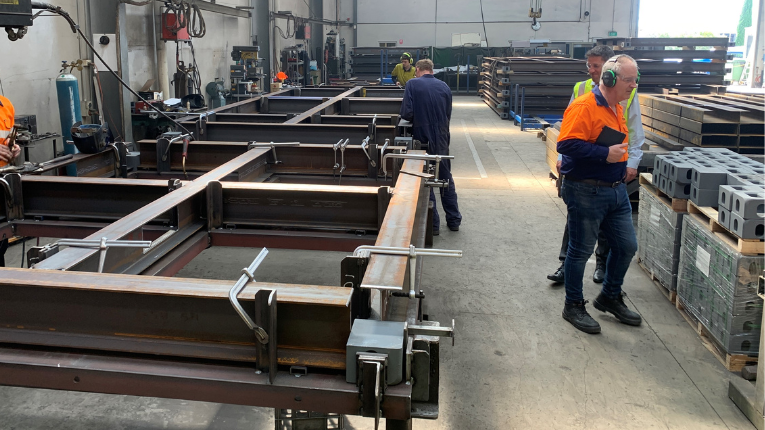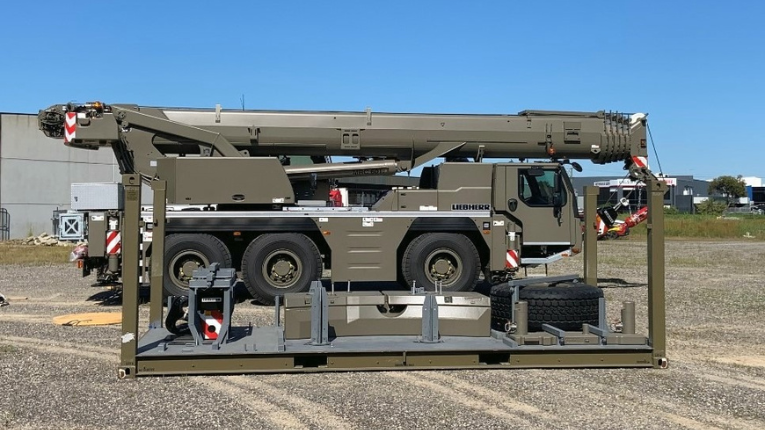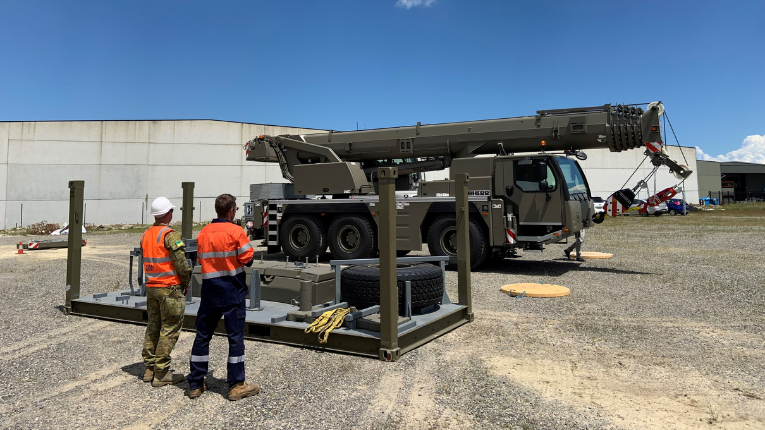Ventia is committed to driving collaborative relationships with our contract partners, to deliver the services that contribute to Australian Defence Force (ADF) operations today and support Australia's Defence industrial capability into the future.
Ventia is delivering 291 engineer support vehicles to the ADF through the LAND 8120 contract. We lead a team of equipment manufacturers and local engineering specialists that will supply 13 different types of earthmoving and material handling vehicles including cranes, excavators, front end loaders and telehandlers. Each vehicle type requires varying levels of modifications to meet specialised Defence requirements such as air transportability and fording.
A bespoke solution with a focus on Australian Industry Capability (AIC)
In addition to the vehicles, many of the systems also require complex bespoke transport cradles which safely and securely store, and facilitate the transport of, equipment attachments such as buckets, augers and hook blocks.
To address this requirement, Ventia collaborated with ECLIPS, an Australian, veteran-owned business to design and build the Complete Equipment Schedule (CES) Cradle Platforms.
"With a priority on Australian Industry Capability, we wanted to engage a highly capable, Australian-owned company who had resources to design, develop and deliver a bespoke solution," says Richard Cave, Ventia's LAND 8120 Contract Manager.
ECLIPS is a highly regarded specialist in designing and fabricating purpose-built logistics platforms for the military, emergency services, commercial transport, and mining sectors with over 15 years' experience, so working with ECLIPS means working with the best.

CAD Models presented in a Detailed Design Review.
The initial proposal was to design the CES Cradle Platforms in Australia and manufacture overseas. During discussions ECLIPS identified the opportunity to transfer the manufacture of the CES Cradle Platforms to Australia. This approach significantly decreased program risk and provided genuine AIC benefits. ECLIPS built a new fabrication capability in Melbourne, leveraging an existing ecosystem of local suppliers and developed advanced manufacturing systems such as robotic plasma cutting. This approach to Australian fabrication not only increases the workshare in Australia for existing SMEs, but also develops new capability that can be leveraged for other Defence programs and commercial industry.
The evolution into Australian manufacture was whole-heartedly welcomed and supported by Ventia, and we worked closely with ECLIPS to support the development of a business case and led the subsequent discussions with Defence's Capability Acquisition and Sustainment Group (CASG).
The subsequent solution will inject an extra $7.1m into the local economy.
"The support that Ventia and the Commonwealth have provided us has been instrumental in ECLIPS being able to establish our own fabrication capability in Australia. Being able to protect our logistics innovations by keeping the detailed IP in Australia supports the growth of a globally unique logistics engineering capability and progress of genuine export opportunities" says Shaun Moore, Managing Director of ECLIPS.
"It has been our experience that Ventia has set a new benchmark in authentic project collaboration with SMEs. At ECLIPS we are very proud of the achievements on this project, but we recognise how important Ventia's 'teamwork approach' has been to our project's success.

Production of the CES Cradle for the Medium Crane at ECLIPS's Australian manufacturing facility
The benefits of local manufacture
- Jobs and skills creation - local production resulted in new positions being created.
- Engagement of downstream suppliers - otherwise rarely engaged in the Defence Industry, local businesses have been engaged to provide steel production, logistics coordination and freight execution, quality, testing and material certification.
- Income retained in the Australian economy.
- No need to travel overseas to inspect and approve manufacture.
- Increased assurance of supply and logistics.
- Leverages opportunities for efficiencies gained from advanced manufacturing technology, as there is financial impetus to invest in the equipment. This empowers a stronger and more competitive local industry.
Rigorous review for the final product
The product development process is subject to rigorous system engineering reviews. Detailed Design Reviews (DDRs), which presents details of the design including CAD models, and a 3D printed scale model are presented to Defence to seek endorsement that the design fully addresses the requirements, the necessary functionality and interfaces are provided and that risks are understood and mitigated.
Physical testing and certification of key components has been successfully completed in Tasmania for the CES Cradle base platforms (ISO 1CX and ISO1DX). This is not only a first for ECLIPS but is a rare achievement in Australia, as this is mainly done overseas. We now move to the physical verification of the competed platform assemblies with the applicable vehicle attachments.
The collaboration between Ventia and ECLIPS is an excellent example of our commitment to working with capable and forward-thinking Australian Industry partners who share our values and sovereign endeavours.
"It also demonstrates our flexibility and the encouragement and support we give to our Australian Industry partners to see their visions become a reality,' says Gavin Campbell, Executive General Manager Defence at Ventia.
Congratulations to the LAND 8120 teams at CASG, Ventia and ECLIPS for your commitment to transitioning to Australian made.

The Australian designed and built ECLIPS CES Cradle in front of the Liebherr LTM1060-3.1 crane, which together will form the first capability to be delivered under LAND 8120.
